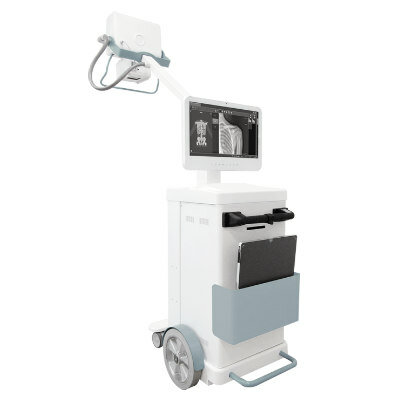Agfa Brings Intelligent Radiography to RSNA 2018
|
By MedImaging International staff writers Posted on 26 Nov 2018 |

Image: Agfa-Gevaert NV demonstrated its purpose-built Enterprise Imaging platform with advanced clinical applications at RSNA 2018 (Photo courtesy of Agfa-Gevaert).
At RSNA 2018, Agfa-Gevaert NV (Mortsel, Belgium) demonstrated its purpose-built Enterprise Imaging platform with advanced clinical applications that brings radiologists to the forefront with confident decision-making, and improved delivery of patient care. The company demonstrated developments in progress to its Enterprise Imaging platform, previewing how it will serve as the foundation to enable machine learning and evidence-based AI enabling task-based workflow automation, image analysis and predictive analytics.
The Enterprise Imaging platform removes traditional barriers to medical imaging, enables multi-specialty care team collaboration and enhanced cross-platform mobility. With embedded advanced applications and AI, Agfa's Enterprise Imaging solution will provide radiologists with additional information for decision-making, speedy access to results and analytics helping significantly improve the patient's care journey and satisfaction, as well as the organization's clinical, operational and financial well-being.
With the task-based rules engine, the aggregation of both imaging and non-imaging data from disparate healthcare information systems, and strong collaboration tools, radiologists can more efficiently make evidence-based decisions and recommendations, and play an enhanced role as consultant for physicians and patients. An approach to precision medicine, analytical intelligence and aggregation of imaging and non-imaging data at the Radiology Desktop will offer patient-centered personalized care delivery, based on analysis of outcomes of similar patient population and data sets.
"Whether detecting cancers or treating chronic diseases, machine learning and advanced analytics will help radiologists and diagnosticians focus less on manual tasks and more on improving care pathways," said Dr. Anjum Ahmed, Global Director Imaging Information Systems at Agfa HealthCare. "Agfa HealthCare's enhancements to the Enterprise Imaging platform, currently in development, will serve as the foundation to enable machine learning and evidence-based augmented intelligence. Unlike AI, which tries to replace human intelligence, augmented intelligence works with and amplifies human intelligence."
"The platform will serve as the intersection of machine learning and advanced applications, where clinical knowledge and medical data converge on a single platform. The potential benefits of augmented intelligence are realized when it is used in the context of workflows and systems that healthcare practitioners operate and interact with, hence introducing efficiencies," added Ahmed.
The Enterprise Imaging platform removes traditional barriers to medical imaging, enables multi-specialty care team collaboration and enhanced cross-platform mobility. With embedded advanced applications and AI, Agfa's Enterprise Imaging solution will provide radiologists with additional information for decision-making, speedy access to results and analytics helping significantly improve the patient's care journey and satisfaction, as well as the organization's clinical, operational and financial well-being.
With the task-based rules engine, the aggregation of both imaging and non-imaging data from disparate healthcare information systems, and strong collaboration tools, radiologists can more efficiently make evidence-based decisions and recommendations, and play an enhanced role as consultant for physicians and patients. An approach to precision medicine, analytical intelligence and aggregation of imaging and non-imaging data at the Radiology Desktop will offer patient-centered personalized care delivery, based on analysis of outcomes of similar patient population and data sets.
"Whether detecting cancers or treating chronic diseases, machine learning and advanced analytics will help radiologists and diagnosticians focus less on manual tasks and more on improving care pathways," said Dr. Anjum Ahmed, Global Director Imaging Information Systems at Agfa HealthCare. "Agfa HealthCare's enhancements to the Enterprise Imaging platform, currently in development, will serve as the foundation to enable machine learning and evidence-based augmented intelligence. Unlike AI, which tries to replace human intelligence, augmented intelligence works with and amplifies human intelligence."
"The platform will serve as the intersection of machine learning and advanced applications, where clinical knowledge and medical data converge on a single platform. The potential benefits of augmented intelligence are realized when it is used in the context of workflows and systems that healthcare practitioners operate and interact with, hence introducing efficiencies," added Ahmed.
Latest RSNA 2018 News
- New AI-Powered Lung Imaging Solution Launched at RSNA 2018
- Carestream Displays Several IT Offerings at Radiology Congress
- Double Black Imaging Announces Expanded Clinical LCD Line at Trade Show
- Lunit Unveils AI-Based Mammography Solution at RSNA 2018
- Guerbet Showcases Ongoing Collaboration with IBM Watson at Radiology Trade Fair
- Fujifilm Showcases New DR Detectors and AI Initiative in Chicago
- M*Modal Launches Cloud-Based Version of AI-Powered Reporting Solution
- MDW Unveils First Radiology Blockchain Platform at RSNA 2018
- Teledyne DALSA Displays Xineos Family of CMOS X-ray Detectors
- SuperSonic Imagine Showcases New Ultrasound System at RSNA 2018
- CIVCO Medical Solutions Introduces Next-Generation of Ultrasound Accessories
- Subtle Medical Showcases Al for PET and MRI Scans at RSNA 2018
- Philips Launches New Platform to Enable Development of AI Assets
Channels
Radiography
view channel
Novel Breast Imaging System Proves As Effective As Mammography
Breast cancer remains the most frequently diagnosed cancer among women. It is projected that one in eight women will be diagnosed with breast cancer during her lifetime, and one in 42 women who turn 50... Read more
AI Assistance Improves Breast-Cancer Screening by Reducing False Positives
Radiologists typically detect one case of cancer for every 200 mammograms reviewed. However, these evaluations often result in false positives, leading to unnecessary patient recalls for additional testing,... Read moreMRI
view channel
PET/MRI Improves Diagnostic Accuracy for Prostate Cancer Patients
The Prostate Imaging Reporting and Data System (PI-RADS) is a five-point scale to assess potential prostate cancer in MR images. PI-RADS category 3 which offers an unclear suggestion of clinically significant... Read more
Next Generation MR-Guided Focused Ultrasound Ushers In Future of Incisionless Neurosurgery
Essential tremor, often called familial, idiopathic, or benign tremor, leads to uncontrollable shaking that significantly affects a person’s life. When traditional medications do not alleviate symptoms,... Read more
Two-Part MRI Scan Detects Prostate Cancer More Quickly without Compromising Diagnostic Quality
Prostate cancer ranks as the most prevalent cancer among men. Over the last decade, the introduction of MRI scans has significantly transformed the diagnosis process, marking the most substantial advancement... Read moreUltrasound
view channel
Deep Learning Advances Super-Resolution Ultrasound Imaging
Ultrasound localization microscopy (ULM) is an advanced imaging technique that offers high-resolution visualization of microvascular structures. It employs microbubbles, FDA-approved contrast agents, injected... Read more
Novel Ultrasound-Launched Targeted Nanoparticle Eliminates Biofilm and Bacterial Infection
Biofilms, formed by bacteria aggregating into dense communities for protection against harsh environmental conditions, are a significant contributor to various infectious diseases. Biofilms frequently... Read moreNuclear Medicine
view channel
New SPECT/CT Technique Could Change Imaging Practices and Increase Patient Access
The development of lead-212 (212Pb)-PSMA–based targeted alpha therapy (TAT) is garnering significant interest in treating patients with metastatic castration-resistant prostate cancer. The imaging of 212Pb,... Read moreNew Radiotheranostic System Detects and Treats Ovarian Cancer Noninvasively
Ovarian cancer is the most lethal gynecological cancer, with less than a 30% five-year survival rate for those diagnosed in late stages. Despite surgery and platinum-based chemotherapy being the standard... Read more
AI System Automatically and Reliably Detects Cardiac Amyloidosis Using Scintigraphy Imaging
Cardiac amyloidosis, a condition characterized by the buildup of abnormal protein deposits (amyloids) in the heart muscle, severely affects heart function and can lead to heart failure or death without... Read moreGeneral/Advanced Imaging
view channel
New AI Method Captures Uncertainty in Medical Images
In the field of biomedicine, segmentation is the process of annotating pixels from an important structure in medical images, such as organs or cells. Artificial Intelligence (AI) models are utilized to... Read more.jpg)
CT Coronary Angiography Reduces Need for Invasive Tests to Diagnose Coronary Artery Disease
Coronary artery disease (CAD), one of the leading causes of death worldwide, involves the narrowing of coronary arteries due to atherosclerosis, resulting in insufficient blood flow to the heart muscle.... Read more
Novel Blood Test Could Reduce Need for PET Imaging of Patients with Alzheimer’s
Alzheimer's disease (AD), a condition marked by cognitive decline and the presence of beta-amyloid (Aβ) plaques and neurofibrillary tangles in the brain, poses diagnostic challenges. Amyloid positron emission... Read more.jpg)
CT-Based Deep Learning Algorithm Accurately Differentiates Benign From Malignant Vertebral Fractures
The rise in the aging population is expected to result in a corresponding increase in the prevalence of vertebral fractures which can cause back pain or neurologic compromise, leading to impaired function... Read moreImaging IT
view channel
New Google Cloud Medical Imaging Suite Makes Imaging Healthcare Data More Accessible
Medical imaging is a critical tool used to diagnose patients, and there are billions of medical images scanned globally each year. Imaging data accounts for about 90% of all healthcare data1 and, until... Read more
Global AI in Medical Diagnostics Market to Be Driven by Demand for Image Recognition in Radiology
The global artificial intelligence (AI) in medical diagnostics market is expanding with early disease detection being one of its key applications and image recognition becoming a compelling consumer proposition... Read moreIndustry News
view channel
Bayer and Google Partner on New AI Product for Radiologists
Medical imaging data comprises around 90% of all healthcare data, and it is a highly complex and rich clinical data modality and serves as a vital tool for diagnosing patients. Each year, billions of medical... Read more






















